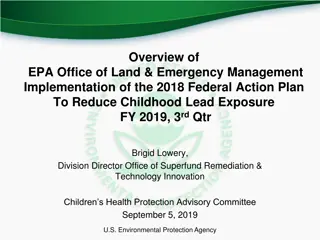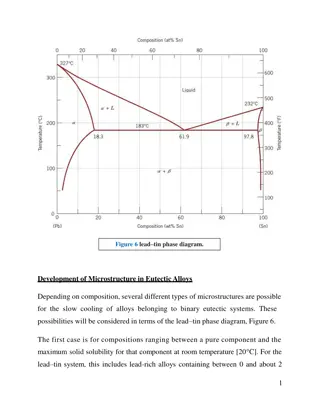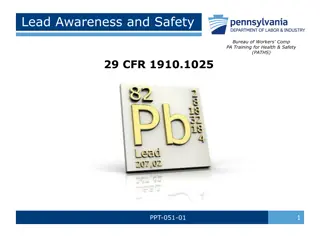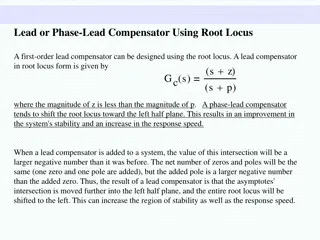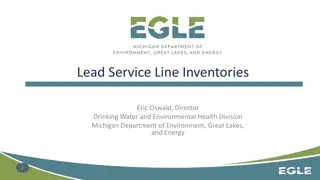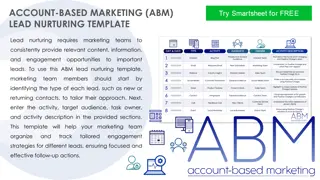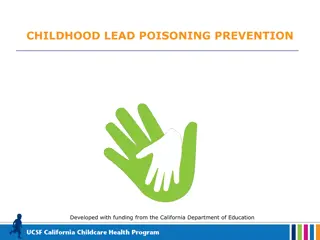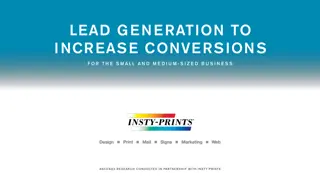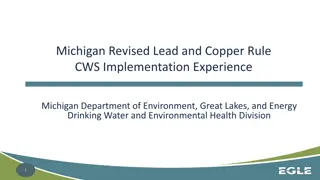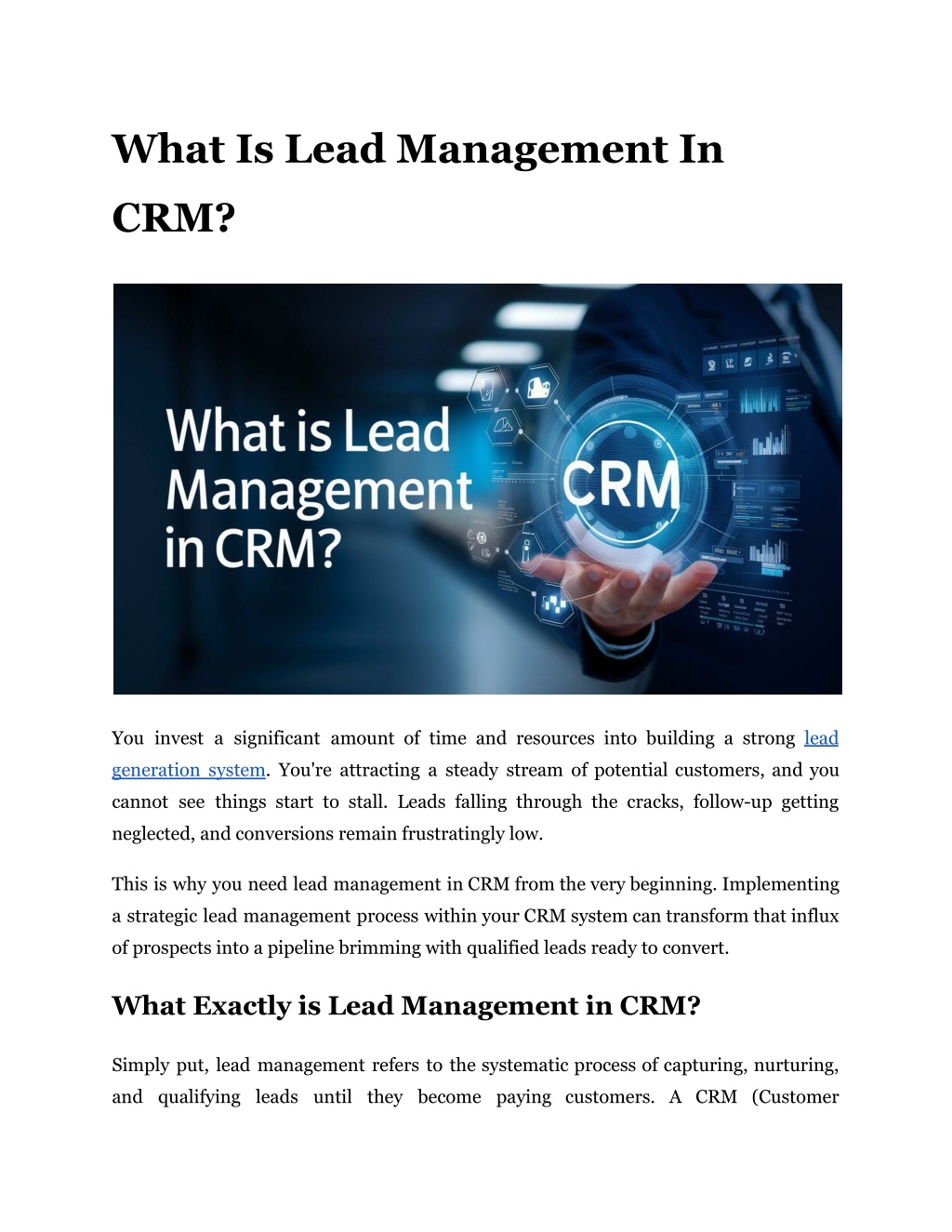
What Is Lead Management In CRM_
You invest a significant amount of time and resources into building a strong leadngeneration system. You're attracting a steady stream of potential customers, and youncannot see things start to stall. Leads falling through the cracks, follow-up get
Download Presentation

Please find below an Image/Link to download the presentation.
The content on the website is provided AS IS for your information and personal use only. It may not be sold, licensed, or shared on other websites without obtaining consent from the author. Download presentation by click this link. If you encounter any issues during the download, it is possible that the publisher has removed the file from their server.
E N D
Presentation Transcript
What Is Lead Management In CRM? You invest a significant amount of time and resources into building a strong lead generation system. You're attracting a steady stream of potential customers, and you cannot see things start to stall. Leads falling through the cracks, follow-up getting neglected, and conversions remain frustratingly low. This is why you need lead management in CRM from the very beginning. Implementing a strategic lead management process within your CRM system can transform that influx of prospects into a pipeline brimming with qualified leads ready to convert. What Exactly is Lead Management in CRM? Simply put, lead management refers to the systematic process of capturing, nurturing, and qualifying leads until they become paying customers. A CRM (Customer
Relationship Management) system acts as the central hub for this entire process, providing the tools and functionalities to streamline every stage of the lead lifecycle. Lead Capture This is where your CRM shines by capturing leads from various sources website forms, landing pages, social media interactions, or even trade shows. Gone are the days of scattered spreadsheets and sticky notes. A CRM centralizes all your lead data, no potential customer will get lost in the shuffle. Lead Qualification CRM empowers you to qualify leads based on pre-defined criteria, such as industry, budget, and decision-making authority. This allows you to prioritize your salesforce's efforts toward the most promising leads, maximizing their time and resources. Lead Nurturing Once you've identified qualified leads, it's crucial to keep them engaged. CRM facilitates automated email campaigns, personalized content delivery, and insightful lead scoring to nurture leads and move them closer to a sale. The Impact of Lead Management on Your Salesforce Equipping your salesforce with a robust lead management system in CRM is akin to giving them a turbocharger. Here's how it empowers your team: Increased Efficiency: CRM automates repetitive tasks such as data entry and lead assignment, freeing up your sales reps to focus on high-impact activities like personalized outreach and relationship building. Improved Visibility: With all lead data readily accessible in the CRM, sales reps gain a clear understanding of each lead's history and interactions. You can then them tailor their approach and increase their chances of closing the deal.
Enhanced Collaboration: CRM fosters seamless collaboration by making lead information readily available to the entire team. Sales managers can monitor progress, provide coaching, and ensure all leads receive consistent messaging. The Synergy Between Lead Generation and Lead Management Salesforce Salesforce, a leading CRM platform, offers a comprehensive suite of tools for both Salesforce lead generation and lead management. By integrating these functionalities, you create a powerful closed-loop system that optimizes your entire sales funnel. Targeted Lead Generation Leveraging Salesforce's marketing automation features, create targeted campaigns that attract high-quality leads aligned with your ideal customer profile. This ensures a steady stream of qualified leads entering your CRM for nurturing and conversion. Seamless Lead Handoff Salesforce eliminates the friction between marketing and sales teams by facilitating a smooth transfer of qualified leads. This ensures timely follow-up and maximizes the window for conversion. Data-Driven Optimization Analyzing Salesforce lead generation campaigns and lead management activities helps you gain valuable insights. Easily refine your strategies, optimize your campaigns, and improve your overall ROI. Beyond Lead Management While lead management is a core function of CRM, the true potential of this technology lies in its ability to cultivate long-lasting customer relationships. Nurture leads with
personalized content and builds trust throughout the sales cycle; you set the stage for a positive customer experience. A CRM empowers you to: Track Customer Interactions: Maintain a complete record of every interaction with your customers, including emails, calls, and support tickets. This means you deliver personalized service and build stronger relationships. Optimize Customer Service: Centralize customer service activities within your CRM, giving your support team a holistic view of each customer's history. Provide faster and more efficient support, fostering customer loyalty. Drive Upsell and Cross-Sell Opportunities: Customer purchase data and preferences within your CRM can identify potential upsell and cross-sell opportunities. This allows you to maximize the value of each customer relationship. Implementing Lead Management in Your CRM Define Your Ideal Customer Profile (ICP) Before diving into lead capture, take a step back and identify your ideal customer profile. Who are you trying to reach? What are their needs and pain points? A clear ICP allows you to tailor your lead generation efforts and attract the right kind of leads. Choose the Right CRM Platform With a plethora of CRM options available, selecting the right one can be overwhelming. Consider factors like scalability, ease of use, and features that align with your specific needs. Popular choices include Salesforce, HubSpot CRM, and Zoho CRM.
Customize Your Lead Capture Forms Design lead capture forms on your website and landing pages that gather relevant information for lead qualification. Don't overwhelm potential customers with too many fields, but capture enough data to assess their fit. Establish a Lead Qualification Process Define clear criteria to determine which leads deserve your salesforce's attention. This might include factors like industry, budget size, or specific needs your product addresses. Develop a Lead Nurturing Strategy Craft automated email workflows, personalize content based on lead interests, and leverage lead scoring to nurture qualified leads and move them down the sales funnel. Integrate with Marketing Automation Tools Connect your CRM with marketing automation tools to create targeted campaigns that generate high-quality leads. Utilize features like lead segmentation and A/B testing to optimize your campaigns for maximum impact. Train Your Sales Team Empower your salesforce by providing comprehensive training on the CRM system and lead management Salesforce best practices. This ensures they can leverage the system's functionalities to their full potential. Streamline Your Sales Process WhiteRock understands the critical role lead management plays in driving business growth. The team helps you implement a foolproof lead management system within
your CRM platform, empowering your salesforce and maximizing your lead conversion rates. Contact us today to schedule a free consultation and discover how we can help you turn prospects into loyal customers! Site Article: What Is Lead Management In CRM?





